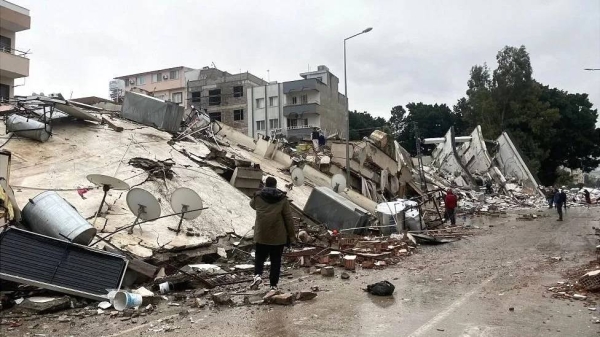
People across Turkey are looking for answers as to how summer wildfires got so desperately out of control, after seven straight days of unusually ferocious fires that continue to blaze throughout the south and west of the country.
Eight people, including two firefighters, have died in the wildfires that have engulfed large parts of Turkey’s Mediterranean coastline since last week and destroyed huge swathes of pine forest and agricultural land. While 137 fires in more than 30 provinces have been extinguished, at least nine are still burning, and more than 10,000 people have yet to return to damaged homes, resorts and hotels evacuated in the middle of the tourism season.
Strong winds, low humidity and scorching temperatures – the weather conditions that helped the fires spread – are likely to continue into next week, in what is widely feared may become increasingly normal for the region as the consequences of the climate crisis become impossible to ignore. The heat intensity of the wildfires is four times higher than anything on record for Turkey, according to satellite data shared with the Guardian last week.
“I am begging for five days, dying and begging [for the authorities to help],” said one distraught resident of a village near the resort town of Marmaris, who lost his house, in a video clip widely shared on Twitter. “There was not even one fire engine here. They said they will help when the fire comes near homes. Well, here you go, it came near homes. How on earth can such management, such governance exist?
“Now they say I should fix my house … God damn all of them. If they have any fear of God or a conscience, they should resign.”
Muhammet Tokat, mayor of the Aegean coast city of Milas, said he was worried about an uncontrolled fire threatening the local thermal power plant. Tokat posted an increasingly urgent series of tweets showing the blazes spreading up a hill toward the presumed location of the plant.
Tokat is a member of Turkey’s main opposition party and one of a growing chorus of voices critical of President Recep Tayyip Erdoğan’s response to the disaster. “It was obvious that this would happen,” he tweeted as the fire neared the power plant. “I am going to cry in anger.”
Fires have also broken out in other parts of the Mediterranean basin, including Lebanon, Greece, Spain and Italy, as hot air from north Africa raises temperatures to more than 40C (104F).
In Turkey, however, where the fires have consumed 95,000 hectares (234,650 acres) compared with an average of 13,516 hectares by this point of the year, President Erdoğan’s government has faced accusations of mismanagement and unpreparedness after admitting the country has no serviceable firefighting planes.
“We are living in hell and we’re not sure what to do now,” said Ahmet Aras, the mayor of Bodrum, a coastal tourist spot, in a video posted to social media.
“It is impossible to intervene here from the land … There can only be an aircraft intervention here, but it’s too late now,” he said as thick clouds of smoke blocked out the blue sky behind him.
Water-dropping aircraft from Ukraine, Russia, Azerbaijan and Iran have come to Turkey’s aid, and while Ankara initially appeared unwilling to accept assistance from western nations, the EU on Monday deployed soldiers and several planes to help. On Tuesday, after social media pressure, the police force also finally started using water cannon – more often used in the increasingly authoritarian country to break up peaceful protests – to extinguish the fires.
Meanwhile, locals have filled everything from household buckets to commercial cement mixers with water to try to put out the fires themselves. The response of Erdoğan’s ruling Justice and Development party (AKP), already slipping in the polls because of its mishandling of Turkey’s economic woes, is seen in many quarters as being out of touch.
On a visit to inspect the damage in Marmaris over the weekend, Erdoğan caused bewilderment by throwing packets of Turkish tea from a moving bus at survivors, and a local AKP official sparked widespread anger by claiming that loan terms for rebuilding would be so generous that “others whose houses didn’t burn down might wish theirs had burned too”.
Turkey’s government-linked media watchdog released a statement on Tuesday warning television stations that continuous live coverage of the wildfires “demoralises the people” and could be punished.
As the scale of the crisis has become clearer, and public anger has grown, government officials appear to have dropped early claims that the fires were set by children or the militant Kurdistan Workers’ party. Instead, evidence suggests that almost two decades of AKP government policy have contributed to the unchecked spread of this year’s wildfires, said Erdoğan Atmış, a forestry policy expert.
“Turkey’s forests are not properly protected as ecosystems and instead seen as income-generating land … As of 2020, 6% of all forest land is no longer [classified as] forests, or are allocated for other purposes such as tourism, mining and energy,” he said.
“On top of that, due to the economic crisis, the budget for preventing forest fires has been reduced, and managers at the general directorate of forestry who are actually knowledgable and experienced when it comes to fighting fires were removed from their jobs and replaced with pro-government people.”
Gökçe Uygun, from Istanbul, who travelled to Manavgat in Antalya province with an aid group to help farmers protect their cows and other livestock from the flames and smoke, said many affected people she had met talked about how the state had not been there to protect them.
“What we feel is we have found out that we are the state ourselves,” she said.











